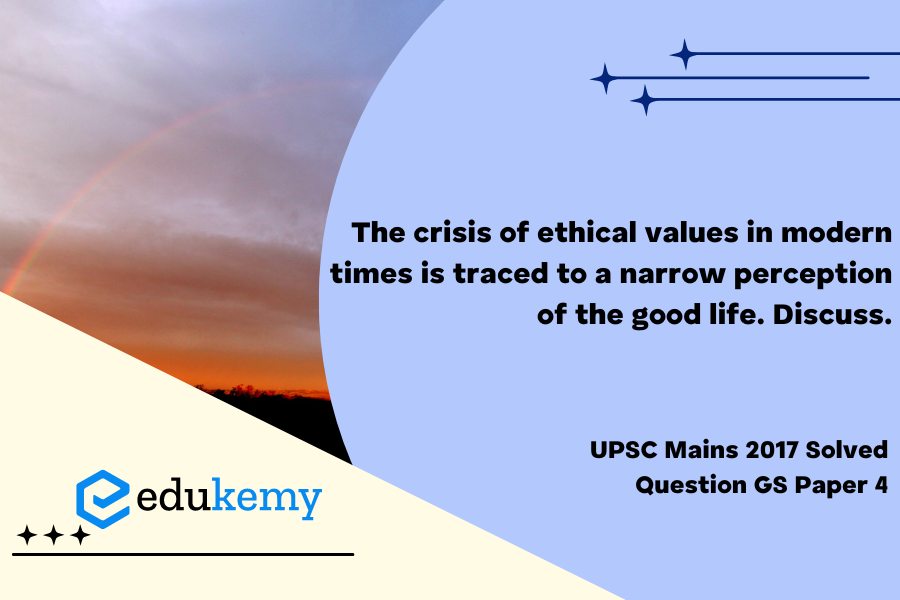The contemporary era grapples with a profound crisis in ethical values, and its roots can be discerned in the constriction of perspectives surrounding the concept of the good life. In the fast-paced and technologically-driven landscape of modern times, there exists a pervasive narrowness in the understanding of what constitutes a fulfilling and morally upright existence. The relentless pursuit of material success, often measured in terms of wealth, fame, and external validation, has overshadowed more holistic and enduring dimensions of the good life. As a result, ethical considerations and values that are foundational to a harmonious society have been marginalized. The myopic focus on individual achievement, often at the expense of communal well-being, has given rise to a moral vacuum, leading to ethical dilemmas and a sense of disconnection within society. This essay will delve into the multifaceted implications of this narrow perception of the good life, exploring its impact on personal conduct, societal norms, and the quest for a more ethically grounded existence.
Tag: Aptitude and foundational values for Civil Service, integrity, impartiality and non-partisanship, objectivity, dedication to public service, empathy, tolerance and compassion towards the weaker-sections.
Contents
Decoding the Question:
- In the Introduction, explain the content.
- In Body, explain how it is linked to narrow perception of the good life.
- Conclude, by mentioning that narrow perception of good life is not sustainable.
Answer:
Tolstoy once said that “True happiness is pleasure without repentance”. A narrow materialistic interpretation of happiness and good life might bring joy for a short time. But conflict in our actions and ethics will cause depression and misery in the long run.

A good life entails the fulfillment of all values, including economic, sociological, emotional, aesthetic, spiritual, ethical, and humanistic ones. The four purusharthas (pillars) – Dharma, Artha, Kama, and Moksha – are realized in the ancient Indian tradition (religion, wealth, sensual pleasures, salvation).
The narrow view of material values, i.e., Artha and Kama (wealth and sensuous pleasure) alone, can be connected to the crisis of ethical values in modern society. The entire purpose of life has become the acquisition of personal success, which is characterised in monetary terms, power, and status.
We can trace the crisis in ethical values while pursuing a good life:
- Integrity: It refers to the honesty or trustworthiness of any individual in personal life or in the discharge of official duties. It is often noticeable that people in responsible posts or people in general, go to any extent to fulfill their desire without any care of integrity. This indeed may lead to a good life for them but their integrity will be at stake.
- Selflessness: It is characterized by low levels of self-centeredness and a low degree of importance given to the self. In this materialistic world, it is very difficult to find people with low self-centeredness. Thinking for self or doing for self is good but collective thinking and collective progress is necessary for strong relationship building and a progressive society. Though selflessness leads to a good life for them but also promotes individualism which may further end in racism.
- Truthfulness: Sometimes people adopt various unethical means or are involved with many unethical practices to have a good life which is generally materialistic in nature. It indeed serves the purpose but hampers truthfulness which is the core human and ethical value.
- Essence and Respect of Values: In today’s world, we see the rise of blatant individualism and the blind pursuit of what is seen as a good life- the minting of more money, success, fame being the most sought after commodities, often being bartered and bought and sold at the market. This in large way erodes the essence and respect of values.
- Morality: Morality has been the hallmark of public life. These days, people put morality at stake while achieving a good life which is merely a short term achievement. Good life can also be achieved by having high morals and it is long lasting.
- Priority of Material Over Values: While measuring success or happiness of an individual, we always give more priority to money, property, likeability and power over the goodwill and strength of character. A person with more wealth will be perceived to be more successful and happy than a person with good character.
As a narrow definition of happiness cannot be sustained in the long run, society as a whole must place a greater emphasis on broader dimensions of values in order to live a higher-quality life. dst of blind rat races to the top. Capitalism and money markets have had a huge role in promoting this nature of materialism and consumerism, where the idea of a good life has been just reduced to making more money and power and buying/possessing things off the market, in the midst of which we are all blinded to believe that this is the good life.
In case you still have your doubts, contact us on 9811333901.
For UPSC Prelims Resources, Click here
For Daily Updates and Study Material:
Join our Telegram Channel – Edukemy for IAS
- 1. Learn through Videos – here
- 2. Be Exam Ready by Practicing Daily MCQs – here
- 3. Daily Newsletter – Get all your Current Affairs Covered – here
- 4. Mains Answer Writing Practice – here


